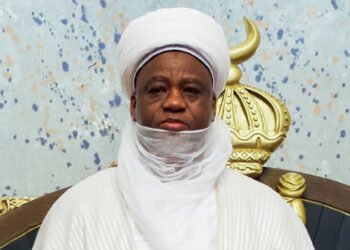The Sultan of Sokoto, Muhammadu Sa’ad Abubakar, has advised the present administration to take urgent steps to mitigate the sufferings of Nigerians.
The Sultan appealed on Monday while speaking at the National Conference on Livestock Reform and Mitigation of Associated Conflicts between Herders and Farmers held in Abuja.
Alluding to the challenges thrown up by the Naira Swap policy of the Central Bank of Nigeria, Muhammadu Sa’ad Abubakar said that insurrection against the government should not be dismissed with a wave of the hand.
He said: “Let’s keep politics aside. The issues of development especially for the common man should be prioritised. These people that God Almighty gave leadership over, one day, God forbid, rise up against us.”
Speaking on the subject of the discourse, the growing animosity between farmers and herders, the Sultan of Sokoto advised that both sides of the divide should imbibe the spirit of give and take for lasting peace.
“I have been to Benue, at least two times as Sultan, to sit with the governors and traditional rulers to discuss peace in the Benue valley. At the end of it, the suggestions, we threw them away. Nothing is done, and we are back to square one.
“Let this conference not be in the same manner, let’s do it and let’s do it well and now.”
Governor of Kano State and initiator of the Conference, Abdullahi Umar Ganduje, declared that the best option and lasting peace to the conflict was the adoption of ranching.
He said: ”The Rural Grazing Areas (RUGA) or ranching, which has been deliberately politicized, remains the only option that would go a long way in mitigating existential problems, as pastoralists would have lands to graze without cattle encroaching on people’s farmlands. Because herders need fodder for their cattle and promote alternative means of producing feedstock, which reduces the need for grazing land.
“We have gone far in the establishment of Ruga Settlement in Kano. Already, 25 housing units out of the projected 500, situated on 4 413 hectares of land at Dansoshiya Forest in Kiru local government, have been completed and handed over to the herders. The replica of the houses will be displayed during an exhibition planned as part of this conference.
“Modernising the livestock sector is not only key to resolving the herder-farmer conflict but was envisaged that this economic investment pillar will support and strengthen the development of market-driven ranches for improved livestock production through breed improvement and pasture production.
“There is, therefore the need for aiding information, education and strategic communication on the development of grazing reserves to mitigate the consequences of these conflicts.
“It is also important that we avoid the dangers of allowing these conflicts to harden to religious or ethnic conflicts. This is the responsibility of political, religious and all other parts our leadership elite in Nigeria.
“We must also intensify existing collaboration with our neighbours especially border communities, to prevent the movement of small arms, and disarming armed pastoralists and bandits who go through our borders day after day.
“Predominantly nomadic pastoralists should be persuaded to move their cattle into established ranches and public grazing reserves, where breeding farms and other mechanized livestock management practices would bolster the sector’s productivity.
“Hand in hand with this, the government should rebuild social capital at the community level to promote mutual trust, confidence building, and consolidate the peace process, while the law and order pillar would support the strengthening of legal frameworks for improving livestock production, peace and harmony.
“It is my hope that this conference will produce a working document that would go a long way in mitigating conflicts between herders and farmers in this country.”
In his welcome address, former INEC Chairman and Chairman Organizing Committee of the National Conference on Livestock Reforms and Mitigation of Associated Conflicts, Professor Attahiru Jega, said the agenda of the conference was “to generate ideas that would contribute to addressing an acute national problem: the relative underdevelopment of the Nigerian Livestock sector and the perpetual crises and conflicts associated with it.“
*Courtesy: Tribune Online)










